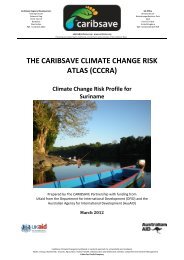Create successful ePaper yourself
Turn your PDF publications into a flip-book with our unique Google optimized e-Paper software.
5.5. Marine <strong>and</strong> Terrestrial Biodiversity <strong>and</strong> Fisheries<br />
Adaptation requires “adjustment in natural or human systems in response to actual or expected climatic<br />
stimuli or their effects, which moderates harm or exploits beneficial opportunities” (IPCC, 2007). The<br />
adaptive capacity of ecosystems then is the property of a system to adjust its characteristics or behaviour,<br />
in order to exp<strong>and</strong> its coping range under existing climate variability, or future climate conditions (Brooks &<br />
Adger, 2004). Despite global action to reduce greenhouse gases, climate change impacts on biodiversity are<br />
unavoidable due to climate inertia. Natural ecosystems have long demonstrated the ability to adapt to<br />
changes in their physical environment. The rate at which climatic change occurs may exceed the rate at<br />
which ecosystems can adapt. Furthermore, natural environments, which are already stressed by human<br />
activities, have compromised ability to cope with <strong>and</strong> to adapt to climate change. This adaptive capacity<br />
assessment thus considers the country’s ability to conserve its biodiversity through managing sustainable<br />
resource use <strong>and</strong> the capacity to implement strategies to protect its natural environment.<br />
Many small isl<strong>and</strong> states generally have low adaptive capacity for some of the same reasons that they tend<br />
to be highly vulnerable to climate change, i.e. small physical size, limited access to capital <strong>and</strong> technology,<br />
shortage of human <strong>and</strong> financial resources (Mimura, et al., 2007). The ability of ecosystems to adjust to<br />
projected climatic changes depends not only on their inherent resilience but also on the ability of resource<br />
users to make required adjustments. By addressing shortcomings in the above indicators adaptive capacity<br />
can be built.<br />
Six principles for adaptation have been identified by Natural Engl<strong>and</strong>, the UK government’s advisor on the<br />
natural environment. Many elements of these principles are neither new nor climate-change specific <strong>and</strong> so<br />
may be applied within the Caribbean context. The principles are as follows (not in order of priority):<br />
Table 5.5.1: Biodiversity: Six principles for climate change adaptation<br />
Conserve existing biodiversity<br />
Reduce sources of harm not linked to climate<br />
Develop ecologically resilient <strong>and</strong> varied l<strong>and</strong>scapes<br />
Establish ecological networks through habitat protection, restoration <strong>and</strong><br />
creation<br />
Make sound decisions based on analysis<br />
Integrate adaptation <strong>and</strong> mitigation measures into conservation management,<br />
planning <strong>and</strong> practice<br />
5.5.1. Policy<br />
126<br />
(Source: Hopkins et al., 2007)<br />
Climate change adaptation strategies for biodiversity can either support or violate principles of equity,<br />
cultural norms <strong>and</strong> sustainable development depending on the policies that guide these actions. The<br />
capacity of countries to implement climate change adaptation strategies will therefore be enhanced by<br />
polices that take advantage of linkages between socio-economic <strong>and</strong> environmental sectors. The<br />
Government of the <strong>Turks</strong> <strong>and</strong> <strong>Caicos</strong> Isl<strong>and</strong>s recognises the importance of a healthy environment <strong>and</strong> has<br />
also begun to consider the threat that climate change poses to the sustainable use of its biodiversity.<br />
Increasing recognition of the importance of preserving environmental health, increased interface with<br />
global environmental institutions <strong>and</strong> the dem<strong>and</strong>s of financial <strong>and</strong> donor institutions have resulted in<br />
improved participation of Caribbean countries in Multi-lateral Environmental Agreements (MEA). To this





